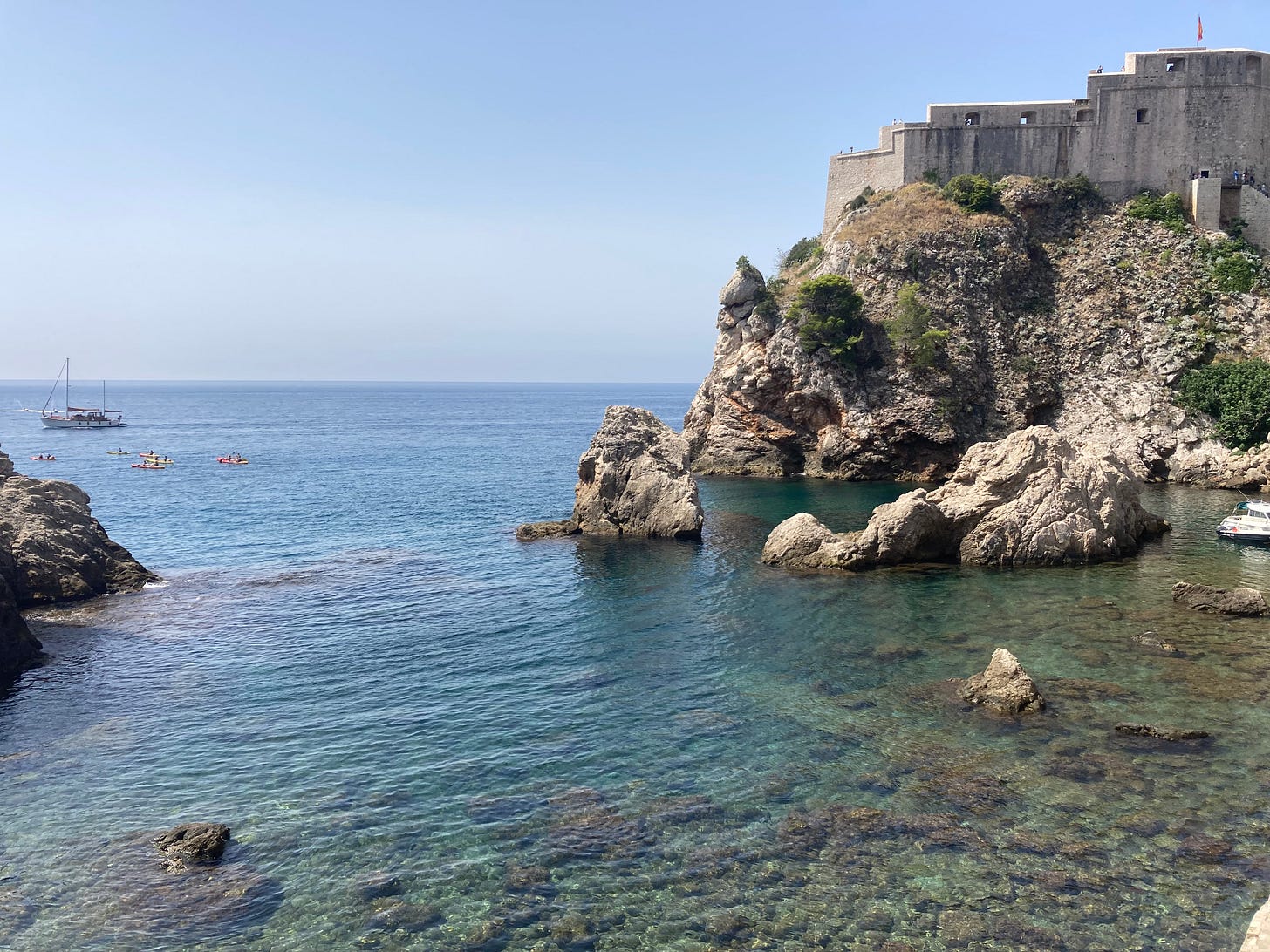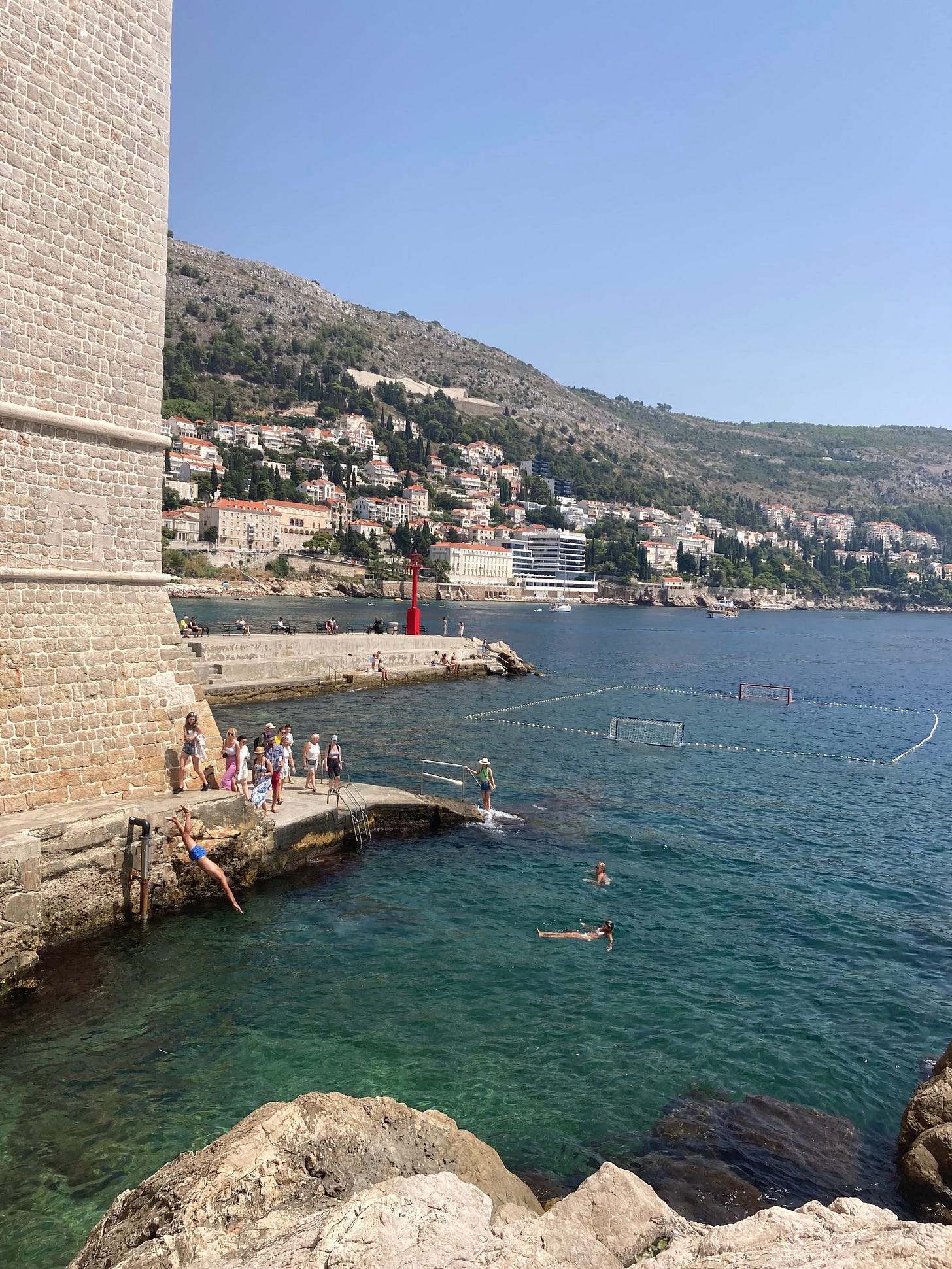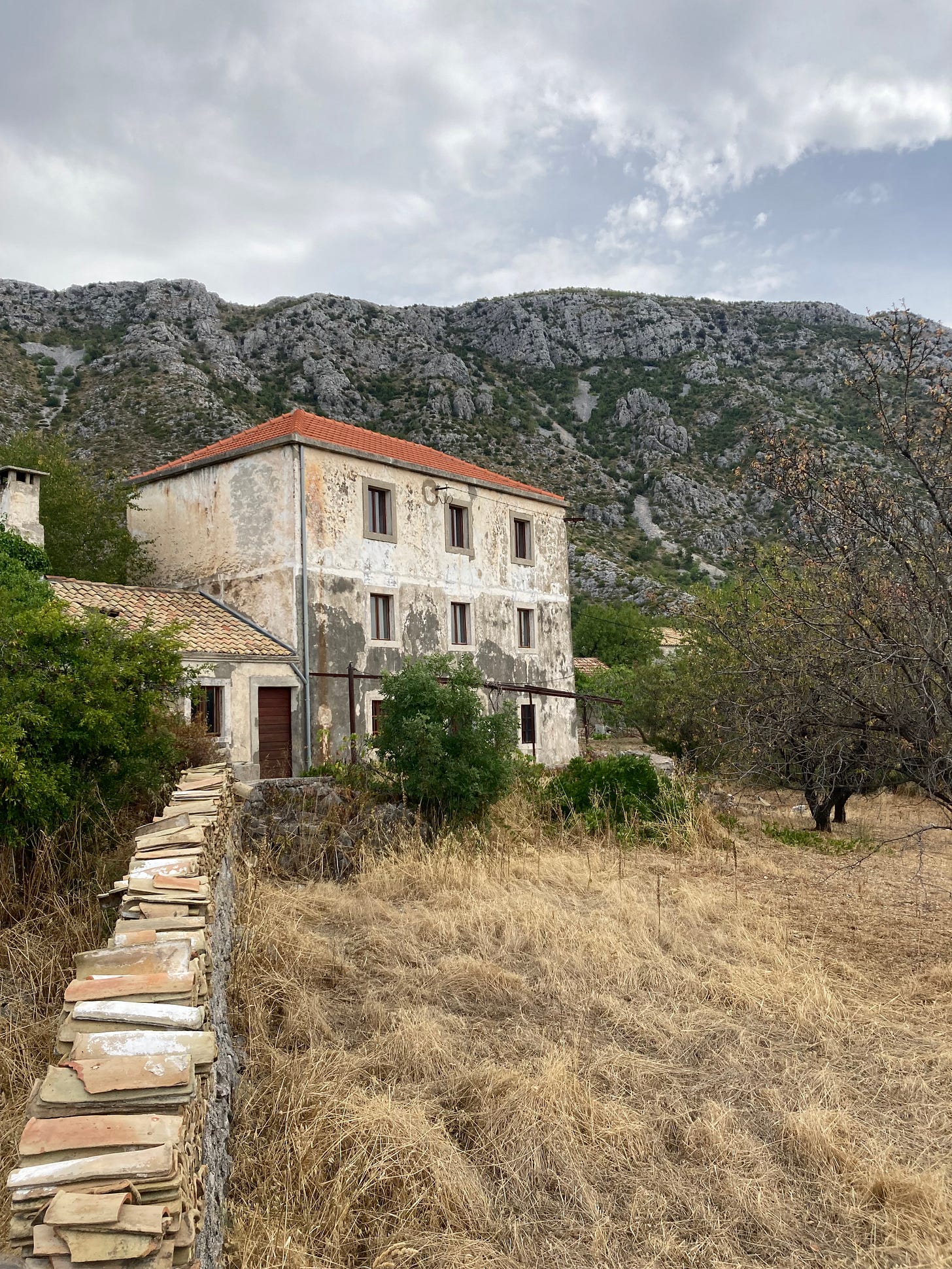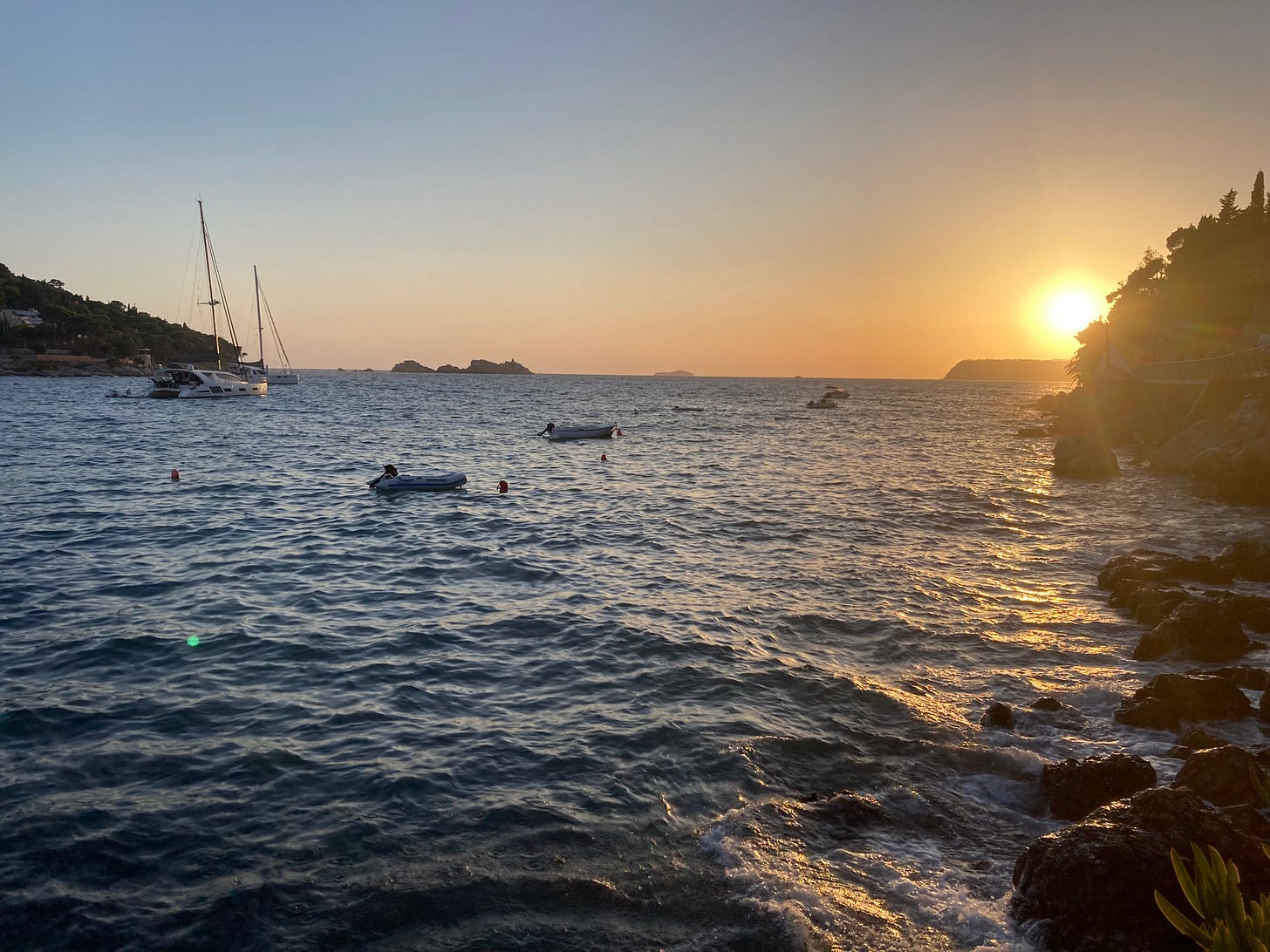Meaning and value are two of the most important concepts in human life. They help us impose order on what otherwise can be a chaotic and arbitrary existence. They reveal our personalities (sometimes even to ourselves), and, when scaled up to the level of a society, form the key components of culture.
Croatia's Dalmatian coast holds both meaning and value. Surveying the beautiful landscape gives a clear reason why. Here, the crystal clear Adriatic Sea crashes up against a dramatic shoreline. The steep cliffs, caves, and rocky outcrops composed of a jagged limestone, give it an aggressive look. The angular rocks are juxtaposed by the deep blue of the Adriatic Sea, which lightens to a translucent opal in the shallows. Next to the shoreline, where the climate is the most humid, the land is flush with greenery. It's easy to find fig, olive, pomegranate, and lemon trees in the surrounding hills, which helped early settlers cultivate the land. Poignant among the trees are the Mediterranean Cypresses, which jolt upwards, straight and thin, as if out of a Dr. Seuss illustration. Then there's the quintessential Croatian architecture; stone — lots of it — covered in red clay roof tiles. The coast’s topography plays the primary role in guiding the roads along which the buildings are built. As a consequence, a cluster of houses perceived from a distance looks angular and chaotic, with no clear order, which, against the backdrop of the sea, create a kaleidoscope of blue, green, white, and red. There are Moorish and Roman monasteries and fortresses in the major port towns like Split and Dubrovnik, hundreds of years old and masterfully built, some of which are situated right atop coastal cliffs.
It's no surprise that land here has become expensive. It's always been meaningful, tourism has now turned it valuable. Europeans have always been aware of Croatia’s beauty. Now the whole world knows, and the tourists are beginning to crowd it’s thin coast.
In Dubrovnik, at the heigh of summer, there can be ten times as many tourists in the old town as locals. The city draws crowds from across Europe and around the world, but rarely Croatia. No, Croatians know the city of Dubrovnik is no longer for them. With a per capita income of around $28,000, who can afford the overpriced hotels, food, and $20 drinks? Only the tourists can pay those prices. And pay they do — still — even after egregious price increases by locals willing to take advantage of the situation. Clearly, the land in Dubrovnik has become incredibly valuable. But what has its increase in value done to its meaning?
Both meaning and value are attributed to elements of the world that carry some significance. However, meaning and value differ in their ability to objectively instantiate that significance. In the case of value, it's as simple as attributing a number — a cost — to an element. From this number, the element enters a taxonomy of other items that have quantitative valuations and are ordered using the mathematical operators of less than, greater than, or equal to. A large proportion of the labour in the modern professional world is completely dedicated to the estimation, arbitration, regulation, promotion, and trade of value. One can go to a car salesman to get an estimation of the value of a car, or to a realtor to get the estimation of the value of a house. Meaning, on the other hand, is trickier. Like value, meaning also attributed to elements of the world that carry significance, but unlike value, meaning can't be reduced to a number or even a simple definition. Rather, meaning is complex — both its characteristics and causes. Emotions seem to play a critical role. Rarely is something meaningful without also triggering an emotional response, and the emotion may not always be positive. Identity, place, and social relations also feature prominently meaning. An old and inconspicuous bench in a run-of-the-mill park carries little value, but may hold great meaning to the married couple who, at that location, shared their first kiss. Conversely, a detached home in Vancouver may carry a lot of value, but holds little meaning if it is left vaccant. These examples illustrate an important point, which is that meaning and value can exist completely independent from one another. Not only that, meaning and value can also be inversely related to one another. That is, as something increases in value, it loses its meaning in matched proportion.
This is something like what has happened in Dubrovnik. The massive influx of tourists has dramatically changed the experience of the old town. It is no longer a place where local history and culture guide interactions. Instead, guides hawk TV tours to over-bloated cruise ship tourists, taking them to the most sanitized and curated locations in the area. As if as a metaphor, in many places, liquid cement has been poured on the rocky coastline, creating flat surfaces, allowing visitors to occupy spaces that, prior to, had personality that demanded deferential interactions.
Yet, something meaningful is preventing me from being too cynical in my analysis. During my time in Dubrovnik, mom and I visited places that, desptie however many tourists were there, still resonated with deep meaning. We visited Kolorina, a small rocky inlet where, about 20 years ago, myself and my two sisters swam as kids. We visited the Buža rocks, an outcrop squisshed between the sea and the city walls, where we watched the sun set. We visited Lapad and Bellevue beaches, two places where my grandmother and grandfather had spent time at during their youths. We ate Dagnje na Buzaru — traditional mussels — and fried smelts, just like my grandfather used to make. We made a trip to the harbour town where my grandmother and grandfather grew up in, visitng their childhood homes as well as the cousins and second cousins who still lived there. We even walked the same path that my grandmother walked everyday to get to school from her house up in hillside.
Each of these experiences proved to me there's still meaning in Dubrovnik. There's still emotion, memory, and family. They also proved to me that meaning and value aren't always related. I now think of them more as operating on differnent planes, only sometimes interacting. Indeed, this is where the word invaluable comes from — the term indicates elements of the world that are so meaningful they exist beyond monetary value. For me, Dubrovnik is invaluable. Its meaning transcends time, transcends generations, transcends popularity, transcends family politics. Coming back has reminded me of its significance, as well as the fact that meaning can exist independent of valuation. It’s for this reason things can retain their meaning despite loosing value. And, on the other side of the coin, there is no value greater than the greatest meaning.






